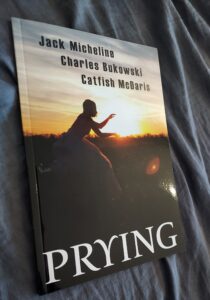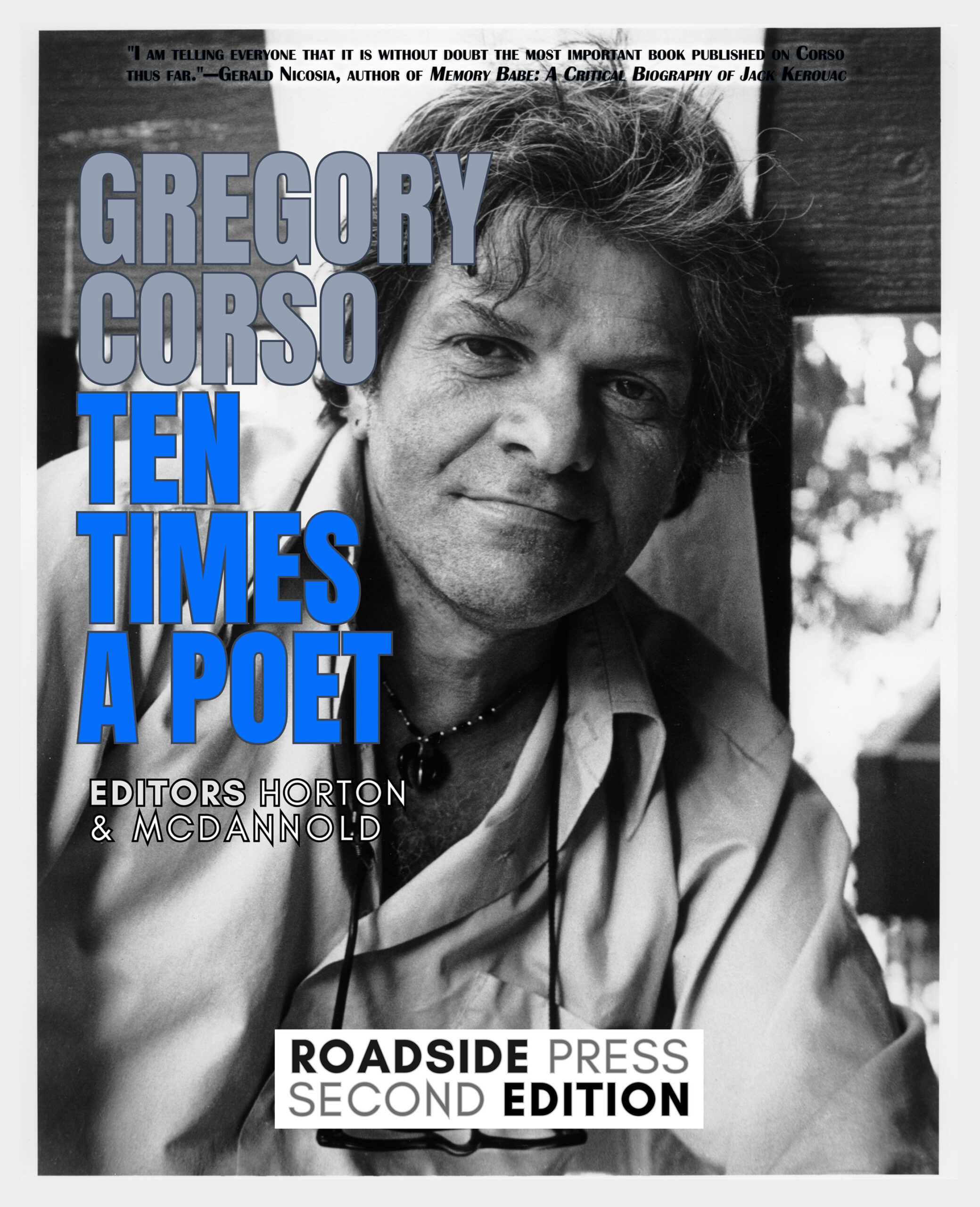 Prying is a collection of work from Jack Micheline, Charles Bukowski, and Catfish McDaris, which was originally published by Four-Sep Publications in 1997. The book has since fallen out of print and Four-Sep Publications is defunct. Michele McDannold, editor of Roadside Press, is bringing this long-lost collection back in a new light with an updated cover and new artwork by Scott Aicher, which really compliments the 1960s feel of the work inside. Roadside Press received express permission from the Micheline Foundation to reprint Jack’s work and that of Bukowski, since he gave the poems to Micheline. McDaris gave his permission as well, as he is the only one of the three still circling the planet.
Prying is a collection of work from Jack Micheline, Charles Bukowski, and Catfish McDaris, which was originally published by Four-Sep Publications in 1997. The book has since fallen out of print and Four-Sep Publications is defunct. Michele McDannold, editor of Roadside Press, is bringing this long-lost collection back in a new light with an updated cover and new artwork by Scott Aicher, which really compliments the 1960s feel of the work inside. Roadside Press received express permission from the Micheline Foundation to reprint Jack’s work and that of Bukowski, since he gave the poems to Micheline. McDaris gave his permission as well, as he is the only one of the three still circling the planet.
The collection starts with five poems by Jack Micheline and they are truly the crowning jewel of Prying. His poems range from the late 60s to late 70s and capture the beat generation in a very musical and eloquent way. His poem “The Song of Kid Willie” from 1968 is the epitome of freedom of that time when youth were trying to break away from the indoctrinated identity given to them by their parents and society of the 40s and 50s. It is a classic struggle to find oneself in an era of upheaval. It is in this poem that Micheline gives us the thrumming beat like wheels on the highway and that feeling of noticing everything and nothing at the same time.
And many nights he wrote his poem on the thigh bone of hearts
Sky, tree, wind, rain, clear skies ahead
His song the open road
His song of love
Jack Micheline also gives a great post-war poem in “My Philosophy” that would have us always choosing the pen over guns. The poem shows how disgruntled he was with the way the world was being governed. His short but darling poem “The City” is a tender look at life unfolding on the edges of a city, including both rich and poor in its makeup.
But the highlight of Micheline’s offering in this collection is “Walking in Kerouac’s Shadow.” It is a poem that works as a summation of any artist’s life in any generation. It expresses the feeling of being disconnected from mainstream society while still having to be mired in it. Having to function within a machine that you hate, being this reluctant cog, but having the eyes of a wolf instead of the blinders of sheep. This poem sees the world for what it is—both the importance and the things disregarded by the masses. It is a timeless poem for a writer who is a junkie for words.
The second section of Prying features Charles Bukowski. In my lifetime, I have had a love-hate relationship with his work. At times, it is both thoughtful and vulnerable, and these moments have always been his best. His fallibility moves me more so than his ability to shock with the recollection of conquering women and being drunk. In my estimation, there will always be two camps of Bukowski that identify with either his brashness or his vulnerability. The four poems in this collection have a little of both.
Bukowski’s poem “extant” has a beat feel to it. I don’t remember coming up much in his work. It uses a lot of sound movement and is erratic. The content of the poem isn’t my cup of tea, but it was exciting to read a poem from him that felt experimental and playful. If you love his horse betting poems, then you won’t be disappointed with the inclusion of “d.n.f.”
For me personally, Bukowski’s best poem in Prying is “to weep in her hair” which is a poem that encompasses mid-life when our bodies fail us and fall apart. He sees himself in this light, examines the dark seed of imposter syndrome that haunts all writers, and how fear can keep us ignorant from the truth. He reaches, lightly, for his youth, imagining he can take the soprano who is the subject of the poem. Bukowski often portrays himself as a lover who takes more than he ever gives.
The difference in the factories was
We all felt our pain
Together
In his poem “help wanted” we see more of the classic subject of women that Bukowski seems to hold on to. He has a love/hate relationship with women. He has a helplessness in their presence that comes out on the page where women seem to be objects who can both save and destroy a man.
I need somebody to pull the
Knife out.
The last section of the book features three pieces of short fiction from Catfish McDaris. He often feels like a bit of a shock value writer putting sexuality front and center in a no nonsense sort of way. Though it often isn’t my sensibility to enjoy this type of writing, I have to hand it to him that goals are achieved. In writing, if you get a reaction, either way, you’ve done your job as a writer. His work can create arguments for or against.
In “Splinter for the Winter,” McDaris starts and ends with a youthful sexcapade that has some elements of humor. I felt the best writing of this story came in the sections that he was describing a young girl’s redneck father. He has a good way of capturing the essence of people, especially when there isn’t any sexual overtone to it. But if you are one that likes stories about sexual escapades and the things that can go wrong when you date three women named Carol, simultaneously, then you’ll love “If This is Love I’m Not Happy.” It has a bit of adventure and definitely some humor.
For me, the shining star of Catfish’s collection is his story “Cobalt” which speaks about his time as a bricklayer, working with his grandfather and his uncle. He really crafts a wonderful short story filled with camaraderie and standing up for people he believes in, even if he might be the underdog in the fight.
A sickening crunch came from his breaking ribs. His nose exploded as I hit him in the face. Standing over him, I held the shovel ready to chop his head off like a rattler. The entire earth was trembling in slow motion.
This reissued collection, Prying, featuring Micheline, Bukowski, and McDaris is a must have for your collection. It is a time capsule of a time capsule to an era that feels so different from the one we are living in today. This is the power of books. It allows us to revisit times we lived before or to imagine ourselves there if we didn’t experience them firsthand. Add Prying to your shelves and go on a journey filled with Beat ideas, women, and mayhem.
—Aleathia Drehmer, author of Running Red Lights and others
a limited number of PRYING copies are available at https://www.magicaljeep.com/product/prying/71



